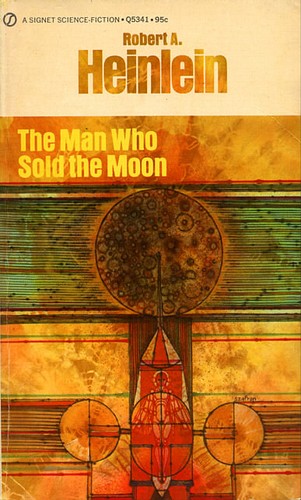
The Man Who Sold the Moon
by Robert A. Heinlein
My rating: ★★★★☆
Read From: 15 September 2013 - 19 September 2013
This is another collection of some of Heinlein's early stories. In this case, more of his "Future History" stories. The volume is almost worth reading just for John Campbell's introduction, explaining why Heinlein was such a great writer.
Simply put, he faced the challenge of conveying the mores and patterns of a strange cultural background, the technological background that created and sustained that culture, and the characters that inhabited that culture. He managed to do it brilliantly, over and over again, without resorting to the info dumps that are so often present in literature.
These stories, "Life-Line", "Let There Be Light", "The Roads Must Roll", "Blowups Happen", "The Man Who Sold the Moon", and "Orphans of the Sky" all illustrate that part of Heinlein's talent. And they're all enjoyable.
"Life-Line"—how would the world react if someone could predict the instant of anyone's death?
"The Roads Must Roll"—Cars do not roll upon the roads. The roads themselves roll. What might force that innovation, what kind of world would it create, and what risks would come with that world?
"The Man Who Sold the Moon"—The one man who most wants to visit the moon, who will do the most to push humanity to the moon, may be the one man who never sees the moon. Poignant.
"Orphans of the Sky"—Residents of a generational starship believe that The Ship is all there is to the universe. They've systematically reinterpreted all of the scientific texts as various forms of allegory and myth. But what happens when one man is convinced of the truth and tries to act the missionary to his fellow voyagers?
This collection is definitely worth a read.
